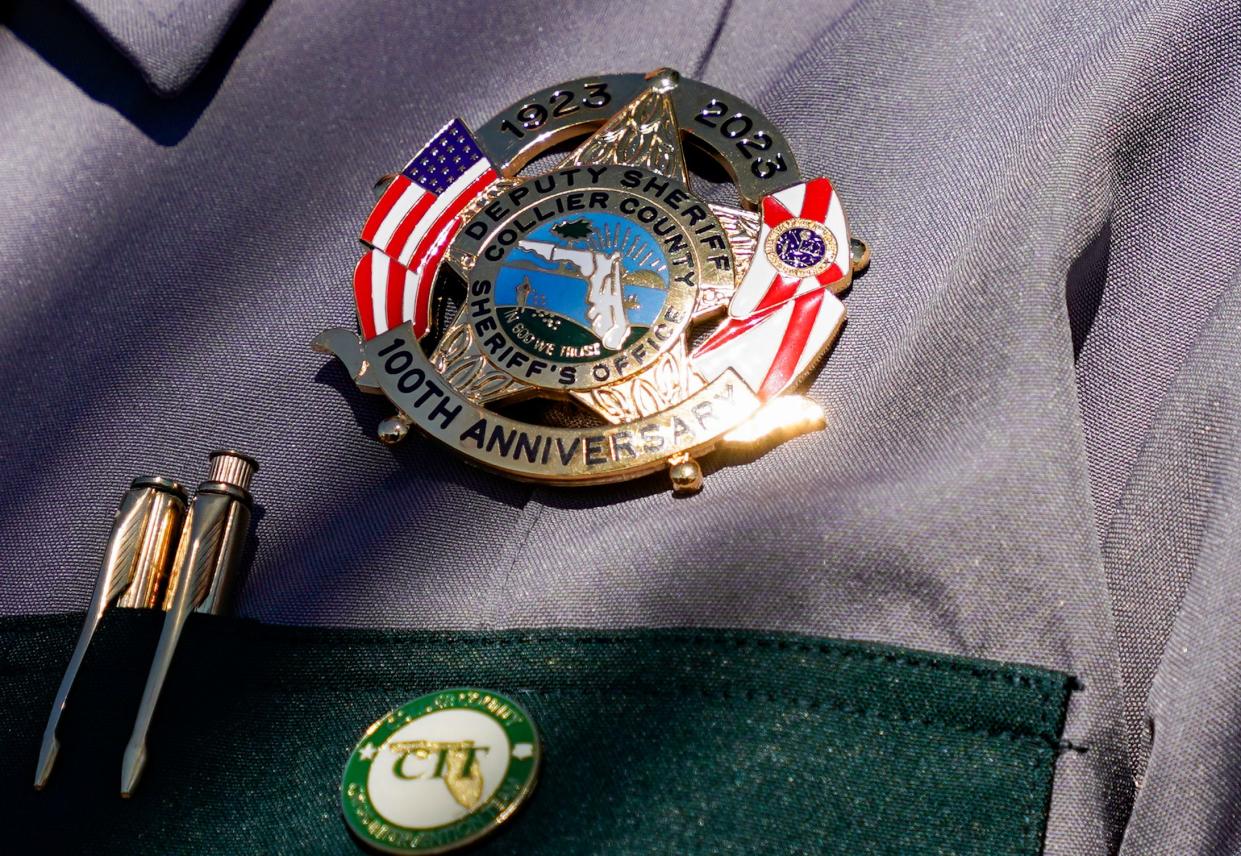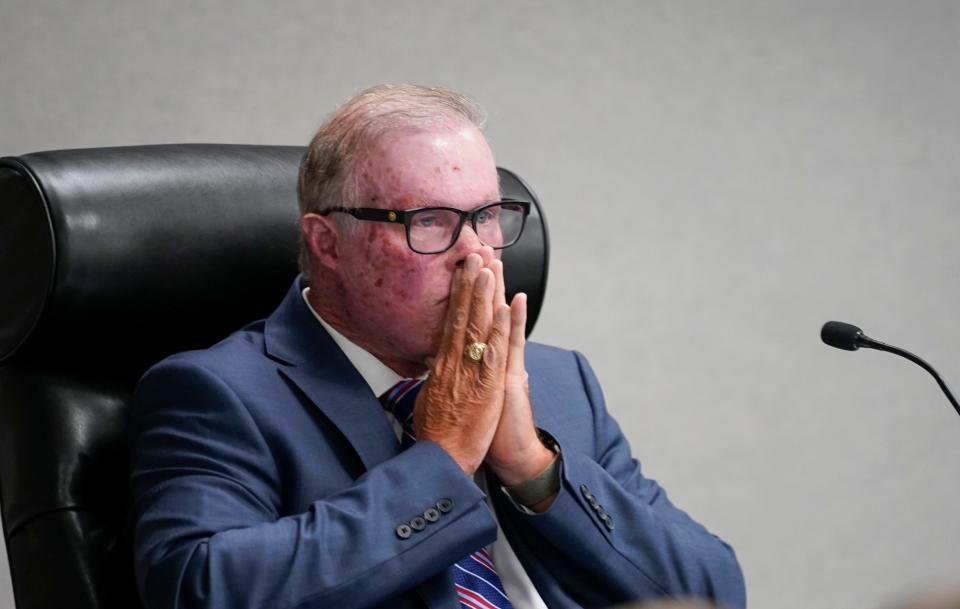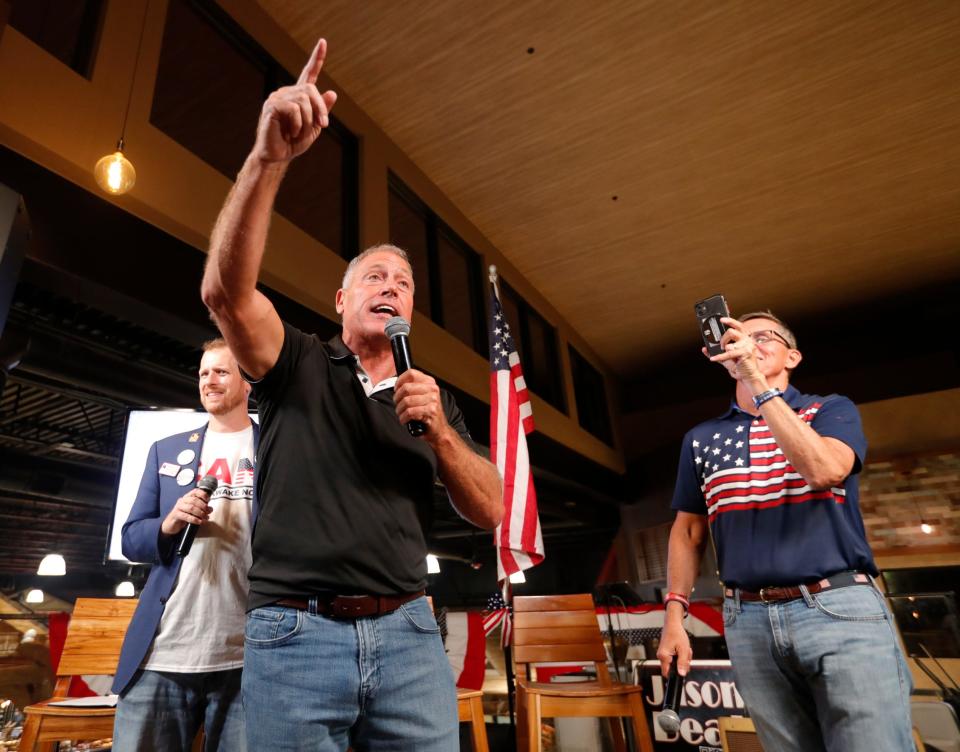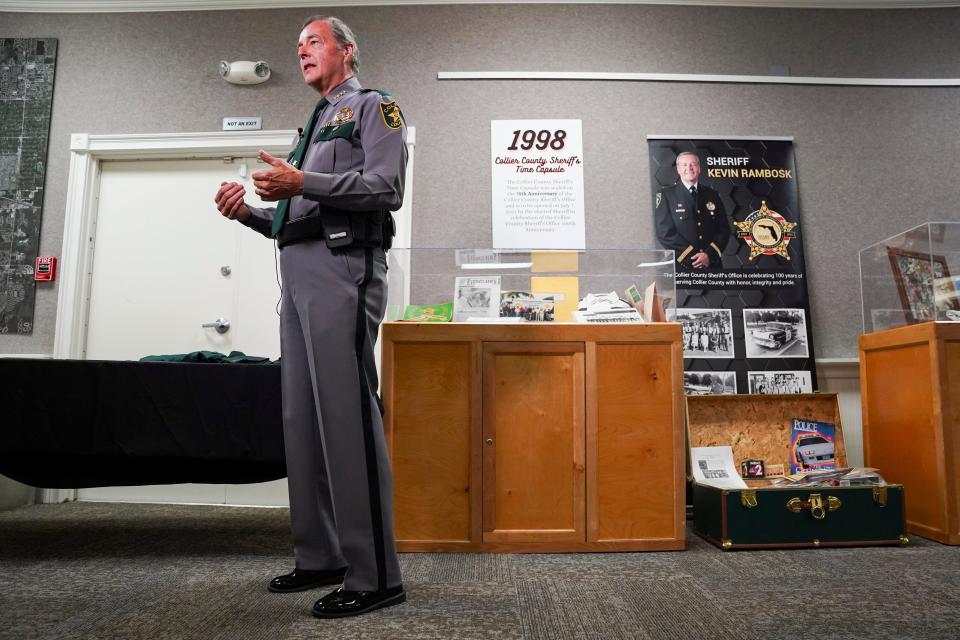Collier Commission changes course, declaring the county as a 'Bill of Rights sanctuary'

- Oops!Something went wrong.Please try again later.
In a protective move, Collier County has declared itself a "Bill of Rights sanctuary."
On Tuesday, county commissioners voted 4-1 in favor of a controversial ordinance to establish the designation. The decision came after the board heard hours of passionate arguments on both sides from residents, business owners and community leaders.
More than 50 people signed up to speak for or against the measure, with some participating via Zoom.
A near-identical ordinance failed in 2021, but the tables turned, with two new faces on the commission, who both supported it.
Chris Hall, one of the newcomers who joined the board in December, revived the proposal.
He brought it back, he said, to honor a campaign promise he made to address the injustices that he and other local residents felt from the federal government and its "three-letter" agencies after the pandemic hit. In particular, he referenced mask mandates.
Hall described the county's sanctuary designation as a way to protect the "God-given" rights of its residents. He said it would allow the county to have the backs of its citizens when there's overreach by the federal government that infringes on those rights.
"This is not an ordinance to go against any constitutional law that comes forth," he said. "This is an ordinance that allows you the people to be protected by anything that comes down that is unconstitutional, or what we would call an unlawful act."

The Bill of Rights includes such liberties as freedom of speech and religion and the right to keep and bear arms.
Commissioners Rick LoCastro and Bill McDaniel voted for the ordinance, as they did the first time around, saying nothing had changed their minds in two years.
Newcomer Dan Kowal sided with the majority, seeing the proposal as a protective move that would hold county commissioners more accountable, discouraging them from blindly following mandates or orders that come down from "upstairs."
"If anything, we are standing with the federal government, at least the document they gave us to live by," he said, referring to the Bill of Rights.
More: Collier commissioner Hall revives controversial 'Bill of Rights sanctuary' declaration
And: Collier Commission rejects Bill of Rights sanctuary county law, opts for resolution
Commissioner Burt Saunders, who rejected the ordinance last time, cast the lone no vote. He continued to raise concerns about its vagueness and its unintended consequences – and to question how it would be interpreted and enforced.
In response, Hall said he purposely left the ordinance a bit vague, particularly when it comes to enforcement, and determining what's unconstitutional.
"It is more common sense than it is anything else," he explained.
In elaborting on his vote, Saunders said he saw the ordinance and the board's discussion around it as a "well-intended exercise," but it failed to muster his support.
"No. 1, I don't think it's necessary," he said. "But, No. 2, it really sends the wrong message to the public."
What does the ordinance say?
The ordinance defines "any federal act, law, order, rule, or regulation, which violates or unreasonably restricts, impedes, or impinges upon" a person's Constitutional rights as unlawful, making any such act "null, void and of no effect in Collier County."
It would prohibit any "agent, department, employee or official of Collier County," from enforcing or investigating any activity relating to the unlawful act. Violators could be sued in Circuit Court and punished under county code.
If the new law should conflict with any others, the most restrictive rules would apply, and should the court overturn sections of the ordinance, the rest of it would remain in effect.
Critics argued the ordinance was illegal, unnecessary and politically motivated and would result in confusion, chaos and lawlessness, as they did in 2021.
Opponents pointed to the ordinance's potential effects on gun safety laws, and public safety in general, and on the county's budget and taxpayers, if it results in more lawsuits brought against elected officials, or other employees, who are found in violation.
Violators could be sued for declaratory and injunctive relief, damages and attorneys’ fees.
Katherine Cunningham, a local lawyer and a volunteer for Moms Demand Action in Collier County, which advocates for common-sense gun laws, described the ordinance as an attempt to undermine and nullify federal law, saying it could have serious consequences, sending the wrong message to criminals.
"It seems like the primary impact of this bill will be to increase litigation against the county," she said. "It's hard to see why you would want to do that."
With the ordinance, nothing changes, unless "something changes" to trample on residents' constitutional rights, Hall said, and then the county has their back.
Supporters urged commissioners to listen to their concerns and defend their rights. That included Alfie Oakes, a vocal business owner and political activist. He warned Saunders he could pay the price when he's up for reelection if he didn't support the ordinance.
"We as the electorate also have the choice not to vote for you, when it comes up again," he said. "We want you to listen to us."
The county and the Naples area, especially, has become a tip of the sphere for "conservative America," Oakes said, where most – including himself – want and expect protection from what they see as a tyrannical federal government.
"Almost everything that I see coming from our federal government right now is unconstitutional," he complained. "We are watching what is happening at the border. If you don't think that's unconstitutional then I don't think that you understand the Constitution."

Oakes has stirred up his share of controversy in Collier County, including his refusal to follow the county's mask mandate during the height of the pandemic, which he challenged in federal court, but lost.
As a Bill of Rights sanctuary, he asserted the county could give its sheriff a "little bit of help" and "even more power" to protect the constitutional rights of its residents.
Collier County sheriff supports the ordinance
Collier County Sheriff Kevin Rambosk spoke in favor of the ordinance, saying it would help he and his deputies do their job, supporting their oath to protect and defend the constitution and their mission to protect the lives, property and constitutional guarantees of all citizens.
"It certainly reaffirms and reemphasizes what we're called upon" to do "each and every day," he said, adding that he didn't see how he could oppose the measure.
If his office deems a federal act, mandate or law as unconstitutional, Rambosk said it may have to "take it to court."

Other high-profile supporters included state Rep. Bob Rommell, R-Naples, and U.S. Congressman Byron Donalds, who represents Southwest Florida.
The ordinance will take effect upon a filing with the Florida Department of State.
"It's a simple thing," Hall said in defense of it. "It's very legal, it's very moral."
Other state and local governments have been successful in becoming sanctuaries from federal gun and immigration laws. More than half of the counties in the United States are now so-called Second Amendment sanctuaries, according to Kristina Heuser, a practicing attorney in New York, who drafted Collier County's more sweeping ordinance.
"I was very careful to be sure that this ordinance was on solid ground," she said.
This article originally appeared on Naples Daily News: Collier Commission declares the county as a 'Bill of Rights sanctuary'

